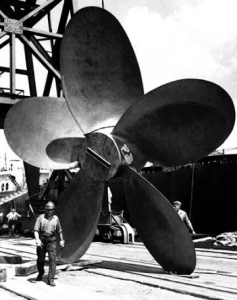I like boy things. When I hear about explosives and magnets and highly nauseating g-forces I am drawn like a moth to flame. I once spent a week in Mumbai hanging out with an engineer who designed ship propellers. You only like me for my propeller talk, he’d say. Not true, but I did like the propeller talk very much. The thought of a propeller the size of a house twisting streams of bubbles is hypnotic and compelling in the extreme. For proof I claim the entire genre of steampunk.
Of course I say “boy things” only to be inflammatory. I loathe the stereotype. But in my life there has been a pattern. When I follow my interests, I walk into a hive of boys. It gets old. Too often, either the boys don’t want me there or they misinterpret my interest.
The lifesaver: girls who like boy things.
When I was nine my best friend was a new girl who moved to our school. She was the only kid who lived in an apartment with her divorced mother, and I was the only girl at the time who was willing to be friends with her. Every day after school I walked her home and we did child-of-single-parent chores and played board games. When she figured out that she’d never be popular doing these things with me, because I would never be popular, she unloaded me like last year’s winter jacket and attached herself to the popular crowd. (Aside: I made out like a bandit from that transaction. She wasn’t into reading, so she gave me the books her English grandmother had sent for Christmas: a handsome hardcover copy of Black Beauty and an old school, gruesome version of Hans Christian Andersen’s Fairy Tales.)
When I was ten, I heaved a shot-put a great distance in PE class. “She’s got an arm,” the teacher said, and put me on the track team. I hung out with another girl who “had an arm,” who I’ll call Jeannie. Thereafter, for a couple of years, Jeannie and I spent every recess and lunch hour throwing and hitting balls. Jeannie didn’t live near me and all her after school hours were taken up with sports. So we were only together during recess and lunch. Mostly, we played catch with an orange plastic mini football.
The gift of Canada is the gift of space. Our elementary school had a lower grass field, an upper grass field, a gravel field, and a field-sized paved court with twelve basketball hoops. As girls with arms, we threw the mini football the full length of the field. A mini football is so light that it wobbles easily. If it becomes unstable it won’t go far. The secret to making it fly the length of the field is to give it a tight spin.
We became good at it. We’d take the ball out and throw it, back and forth, and neither of us said a thing. Jeannie was a girl of few words. No doubt I missed out on trends, secrets, private wars, and ecstasies of hair and fabric, deprived as I was of girl-talk. Instead we watched our projectile go up into the sky. Blue sky, white sky, cloudy sky, stinging cold sky, gold glare sky.
I read about this exact thing years later, about throwing the mini football into the sky. Only it wasn’t a mini football, and Jeannie wasn’t there. It was John Updike writing about a man playing golf. When I read John Updike’s description of hitting the golf ball just right and watching it sail into the sky I felt yeah, oh yeah, heck yeah. I get this, and quite miraculously, John Updike gets this. Maybe he threw a mini football too.
I’m glad no one forced Jeannie and me to improve our networking skills during recess and lunch. I don’t know what the mini football did for Jeannie, but it made me look into the sky repeatedly, and gave me a basis for enjoyment when I read. Maybe necessary to the enjoyment of reading are experiences, sensory experiences that resonate with language. If you don’t have them, what happens when you read about them?


2 Responses to It’s a boy thing